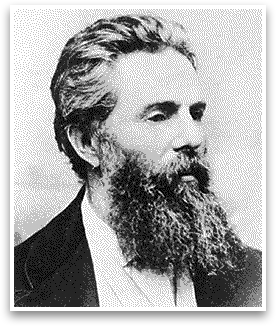
Herman Melville
Herman Melville had gained enough practical experience by the time he was in his early twenties to be able to write stories about everything from dehumanizing office life to adventurous whaling ships. By combining his life experiences with voracious reading habits, Melville has become canonized as a top tier American writer.
Though his popularity declined markedly in his own lifetime, Melville's mastery of psychological and philosophical subject matter combined with his literary breadth and power leave him with few peers, in America or elsewhere.

Themes and Facts
- Melville is best known for his massive novel Moby Dick, which draws upon Melville's practical experience upon a whaling boat as well as the literary influences of Shakespeare, Milton, Emerson, and others.
- He held a large number of jobs, all of which provided him with appropriate fodder for his stories.
- Though widely respected in various circles, Melville was never a hugely successful writer in his own lifetime. The family often struggled financially.
- He devoted himself to poetry in his later years.
- Several of Melville's stories, including "Bartleby, the Scrivener" were published anonymously.
- In writing "Bartleby, the Scrivener," Melville drew upon many influences, including Jonathan Edwards ("Inquiry into the Freedom of the Will") and Ralph Waldo Emerson ("The Transcendentalist").
Study Questions
- What is the rhetorical significance of Bartleby's enigmatic statement, "I prefer not to"? Why "prefer"? Why not simply decline to do what is asked of him?
- What is the significance of the narrator being unnamed? Is this narrator reliable?
- Is it important that Melville, a respected but struggling writer, makes Bartleby a "writer"?
- What do you think is Melville's criticism of the world of Bartleby and his co-workers?
- What is the significance of the heavily detailed description of Bartleby's co-workers?
- Is it important that Bartleby had once worked at the Dead Letters office?
With the story of Bartleby, Melville captures both humorously and poignantly the emptiness that accompanies the repetitive office life that is so prevalent in Melville's world as well as our own. The unnamed narrator's concern for Bartleby may ultimately mask his guilt for exploiting his workers, a not uncommon practice.